Bell-ringers in Stohos, Thessaloniki, Picture: www.clickatlife.gr
Most people may associate the feast of the first Sunday before Lent in Greece with big carnivals, parades and wild dancing. However, a lot of places in the country keep customs and traditions that have been passed unchanged from generation to generation. Traditions for this holiday in Greece are sometimes related to history and myths of the area, but other times they are simply an occasion for an escape from everyday life. Preparation often starts weeks before the holiday, and the peak is on the first Sunday before Lent, when each region holds large celebrations until the morning of Clean Monday.
Northern Greece
Naoussa
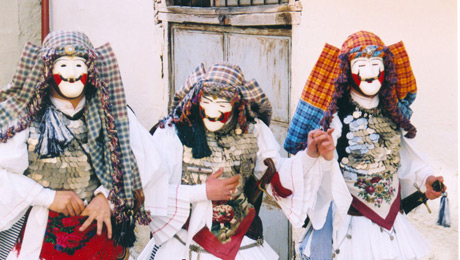
Originating from the Dionysian festivals, the custom "janissaries and brides" is still alive. On the first Sunday before Lent, to the sound of drums and zournas, a large number of "janissaries" wander the streets of the city and gather in front of the City Hall, where the feast is held. The bride (a disguised young man), comes to the window and, with characteristic movements, so that the sound of the gold coins of his attire can be heard, he greets the janissaries, goes downstairs and joins the crowd. Gradually, people of all ages gather and take part in the revival of the custom.
Xanthi
On the first Sunday before Lent, in Xanthi, on the bridge of the Kosintos River, the custom of "Burning the king" comes to life. The king is a human-like figure standing on sticks, which burns and chases Evil. The custom was brought by Samakov refugees to Eastern Thrace and it is revived every year by the inhabitants of the neighbourhood of the same name. After the king has been burnt, celebrations continue until the morning.
Kozani
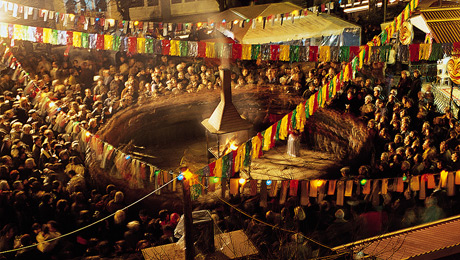
Fanos, the symbolic torch of holiday fire has been lit for centuries in Kozani. Regardless of the disputes about its origin, this custom gives the city a festive mood. On the first Sunday before Lent, the largest "Fanos", is lit on the central square, followed by smaller neighbourhoods that also burn their own "Fanos" ... and a mad celebration of a Dionysian kind starts. An increasing number of people gather around the fire and songs merge with one another. Most songs are playful and satirical. Wine is poured, local specialties are abundant and the feast lasts until the morning.
Ioannina
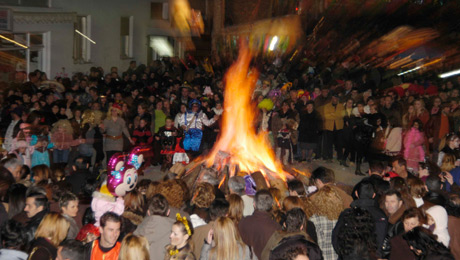
"Jamals" - festive fires on the first Sunday before Lent - burn in different districts of Ioannina on Sunday evening before the Long Lent. This custom has existed since the nineteenth century, and, since the '80s, it has been recreated every year. "Jamals" warm people up after the cold winter, and the big celebration starts with lighting the first match.
Serres
The custom "Kaluger" (meaning monk) comes from the region of Serres. It starts with "fire-dancers" and mimes that form a bizarre troupe, the members of which include the king, the king's son, the monk, the bride, the grandmother with the prematurely born baby, the Gypsies with the bear and the guards. The troupe visits all the houses in the village, and then the inhabitants gather in the square, where the field is prepared for planting. A scene of death and resurrection follows, with the monk playing the main part.
Sohos, Thessaloniki
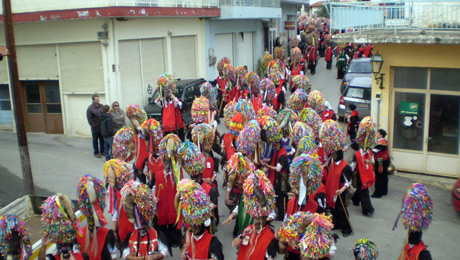
This custom is associated with fertility and, for many people, with love, too. "Bell-ringers" may be seen even today in Sohos. This is a very ancient custom, which has remained unchanged for centuries. The peak of the holiday is during the three days before Clean Monday and people dressed in goat costumes, with bells all over their attire, dance in the streets and squares. The custom of forgiveness also enjoys a special status. Traditionally, the elderly forgive the sins of the young who visit them and kiss their hand, giving them an orange.
The islands
Karpathos
On Clean Monday, Karpathos holds the "People's Court for immoral behaviour." This is an opportunity for purification and administration of justice at the beginning of the Long Lent. The defendants are those who insult or provoke others by their behaviour. Local guards who arrest "the perpetrators" take them to court. The elders of the island are judges, and that is the reason for the jokes as the harbinger of the holiday.
Naxos
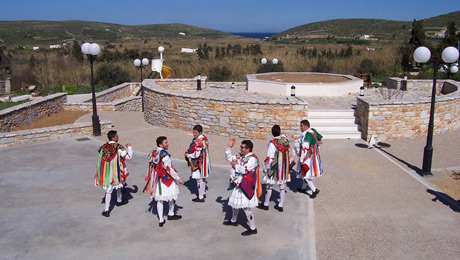
Even today, the worship of Dionysus can be traced in the traditions for the first Saturday of Lent in Naxos. Festivities begin on the first Saturday of Lent with the slaughtering of pigs. On "Meat" Sunday, "bell-ringers" wander the streets - these are hooded youths with bells hanging around their waists. Their dance is accompanied by the sound of the bells and they banter with the people. Locals always give them boiled eggs. The group includes "The old man", "The old woman" and "The bear." Some of the scenes which are performed include "The Wedding of the Bride," "Death," "Resurrection of the Dead." On Clean Monday, young men dressed in kilts go out in the streets and play violins.
Leros